Crotonaldehyde, predominantly trans
Sigma-Aldrich Inc
Revision date : 2022-12-08
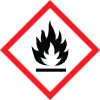
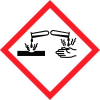
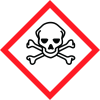
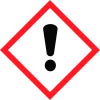
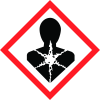
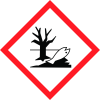
General Information
Revision date
2022-12-08
Product name
Crotonaldehyde, predominantly trans
CAS No.
123-73-9
Emergency telephone
800-424-9300 CHEMTREC (USA) +1-703- 527-3887 CHEMTREC (International) 24
Icons in SDS
Company Information
Company name
Sigma-Aldrich Inc
GHS Information
Signal word
Danger
Hazard Codes
Hazard statements (CLP)
H225, H301, H301+H311, H311, H315, H318, H330, H335, H341, H351, H373, H400
Hazard statements
Code
Statements
H225
Highly Flammable liquid and vapour
H301
Toxic if swallowed
H301+H311
Toxic if swallowed or in contact with skin
H311
Toxic in contact with skin
H315
Causes skin irritation
H318
Causes serious eye damage
H330
Fatal if inhaled
H335
May cause respiratory irritation
H341
Suspected of causing genetic defects
H351
Suspected of causing cancer
H373
Causes damage to organs through prolonged or repeated exposure
H400
Very toxic to aquatic life
Precautionary statements
Code
Statements
P201
Obtain special instructions before use.
P202
Do not handle until all safety precautions have been read and understood.
P210
Keep away from heat, hot surface, sparks, open flames and other ignition sources. - No smoking.
P233
Keep container tightly closed.
P240
Ground/bond container and receiving equipment.
P241
Use explosion-proof [electrical/ventilating/lighting/.../] equipment.
P242
Use only non-sparking tools.
P243
Take precautionary measures against static discharge.
P260
Do not breathe dust/fume/gas/mist/vapors/spray.
P264
Wash ... thoroughly after handling.
P270
Do not eat, drink or smoke when using this product.
P271
Use only outdoors or in a well-ventilated area.
P273
Avoid release to the environment.
P280
Wear protective gloves/protective clothing/eye protection/face protection.
P284
[In case of inadequate ventilation] Wear respiratory protection.
P303+P361+P353
IF ON SKIN (or hair): Take off Immediately all contaminated clothing. Rinse SKIN with water [or shower].
P305+P351+P338
IF IN EYES: Rinse cautiously with water for several minutes. Remove contact lenses if present and easy to do - continue rinsing.
P308+P313
IF exposed or concerned: Get medical advice/attention.
P310
Immediately call a POISON CENTER or doctor/physician.
P332+P313
IF SKIN irritation occurs: Get medical advice/attention.
P362
Take off contaminated clothing.
P370+P378
In case of fire: Use ... to extinguish.
P391
Collect spillage.
P403+P233
Store in a well-ventilated place. Keep container tightly closed.
P403+P235
Store in a well-ventilated place. Keep cool.
P405
Store locked up.
P501
Dispose of contents/container to ...
Section 2
OSHA HCS Classification
Flammable liquids (Category 2), H225 Acute toxicity, Oral (Category 3), H301 Acute toxicity, Inhalation (Category 1), H330 Acute toxicity, Dermal (Category 3), H311 Skin irritation (Category 2), H315 Serious eye damage (Category 1), H318 Germ cell mutagenicity (Category 2), H341 Carcinogenicity (Category 2), H351 Specific target organ toxicity - single exposure (Category 3), Respiratory system, H335 Specific target organ toxicity - repeated exposure (Category 2), H373 Short-term (acute) aquatic hazard (Category 1), H400 For the full text of the H-Statements mentioned in this Section, see Section 16.
Signal word
Danger
Hazard statements
H225 Highly flammable liquid and vapor. H301 + H311 Toxic if swallowed or in contact with skin. H315 Causes skin irritation. H318 Causes serious eye damage. H330 Fatal if inhaled. H335 May cause respiratory irritation. H341 Suspected of causing genetic defects. H351 Suspected of causing cancer. H373 May cause damage to organs through prolonged or repeated exposure. H400 Very toxic to aquatic life.
Precautionary statements
P201 Obtain special instructions before use. P202 Do not handle until all safety precautions have been read and understood. P210 Keep away from heat/ sparks/ open flames/ hot surfaces. No smoking. P233 Keep container tightly closed. P240 Ground/bond container and receiving equipment. P241 Use explosion-proof electrical/ ventilating/ lighting/ equipment. P242 Use only non-sparking tools. P243 Take precautionary measures against static discharge. P260 Do not breathe mist or vapors. P264 Wash skin thoroughly after handling. P270 Do not eat, drink or smoke when using this product. P271 Use only outdoors or in a well-ventilated area. P273 Avoid release to the environment. P280 Wear protective gloves/ protective clothing/ eye protection/ face protection. P284 Wear respiratory protection. P301 + P310 + P330 IF SWALLOWED: Immediately call a POISON CENTER/ doctor. Rinse mouth. P303 + P361 + P353 IF ON SKIN (or hair): Take off immediately all contaminated clothing. Rinse skin with water/ shower. P304 + P340 + P310 IF INHALED: Remove person to fresh air and keep comfortable for breathing. Immediately call a POISON CENTER/ doctor. P305 + P351 + P338 + IF IN EYES: Rinse cautiously with water for several minutes. P310 Remove contact lenses, if present and easy to do. Continue rinsing. Immediately call a POISON CENTER/ doctor. P308 + P313 IF exposed or concerned: Get medical advice/ attention. P332 + P313 If skin irritation occurs: Get medical advice/ attention. P362 Take off contaminated clothing and wash before reuse. P370 + P378 In case of fire: Use dry sand, dry chemical or alcohol-resistant foam to extinguish. P391 Collect spillage. P403 + P233 Store in a well-ventilated place. Keep container tightly closed. P403 + P235 Store in a well-ventilated place. Keep cool. P405 Store locked up. P501 Dispose of contents/ container to an approved waste disposal plant.
2.3 Other hazards
Lachrymator.

